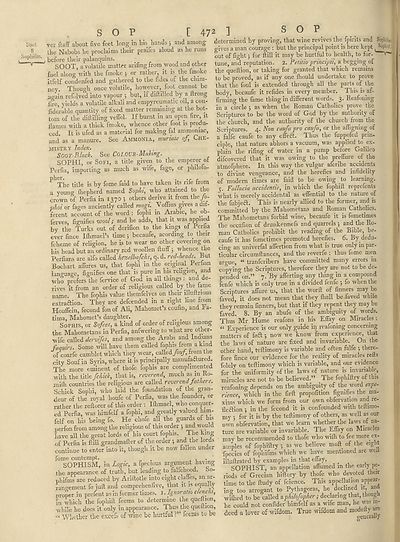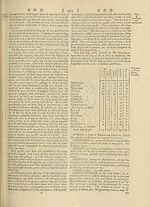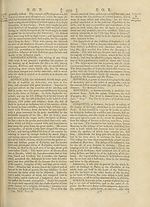Encyclopaedia Britannica, or, a Dictionary of arts, sciences, and miscellaneous literature : enlarged and improved. Illustrated with nearly six hundred engravings > Volume 19, Scripture-SUG
(518) Page 472
Download files
Complete book:
Individual page:
Thumbnail gallery: Grid view | List view

iioot
II
Sopliii'ni.
SOP [
rer ftaff about five feet long in his hands; and among
the Nabobs he proclaims their praifes aloud as he runs
i before their palanquins.
SOOT, a volatile matter arifing from wood and other
fuel along with the fmoke } or rather, it is the fmoke
itfelf condenfed and gathered to the fides of the chim¬
ney. Though once volatile, however, foot cannot be
again refolved into vapour *, but, if diftilled b} a ftrong
lire, yields a volatile alkali and empyreumatic oil, a con-
fiderable quantity of fixed matter remaining at the bot¬
tom of the diftilling veffel. If burnt in an open fire, it
flames with a thick fmoke,. whence other foot is produ¬
ced. It is ufed as a material for making fal ammoniac,
and as a manure. See Ammonia, muriate of, Che¬
mistry Index.
SOOT-Black. See COLOUR-Making.
SOPHI, or Sofi, a title given to the emperor of
Perfia, importing as much as wife, fage, or philofo-
Xhe title is by fome faid to have taken its rife fiom
a young Ihepherd named Soplu, who attained to the
crown of Perfia in 1370 ; others derive it from the/o-
phoi or fages anciently called magi. Voffius gives a dif¬
ferent account of the word : fophi in Arabic, he ob-
ferves, fignifies wool; and he adds, that.it was applied
by the Turks out of derifion to the kings of Perfia
ever fince lihmael’s time; becaufe, acording to their
fcheme of religion, he is to wear no other covering on
his head but an ordinary red woollen Huff; whence the
Perfians are alfo called hexelbafchs, q. d. red-heads. But
Bochart allures us, that fophi in the original. Perfian
language, fignifies one that is pure in his religion and
who prefers the fervice of God. in all things : and de¬
rives it from an order of religious called by.the lame
name. The fophis value themfelves on their illuftrious
extraftion. They are defeended in a right line from
Houffein, fecond fon of Ali, Mahomet’s coufin, and Fa¬
tima, Mahomet’s daughter. .
Sophis, or Sofces, a kind of order of religious among
the Mahometans in Perfia, anfweringto what are other-
wife called dervifes, and among the Arabs and Indians
faquirs. Some will have them called fophis from a kind
of coarfe camblet which they wear, called/cw/, from the
city Soufin Syria, where it is principally manufadured.
The more eminent of thofe fophis are complimented
with the titlethat is, reverend, much as in Ro-
milh countries the religious are called reverend fathers.
Schiek Sophi, who laid the foundation of the gran¬
deur of the royal houfe of Perfia, was the founder, or
rather the reftorer of this order : Ilhmael, who conquer¬
ed Perfia, was himfelf a fophi, and greatly valued him-
felf on his being fo. He chofe all the guards of his
perfon from among the religious of this order ; and would
have all the great lords of his court fophis. I he king
of Perfia is ftill grandmafter of the order •, and tne lords
continue to enter into it, though it be now fallen under
fome contempt. . , .
SOPHISM, in Logic, a fpecious argument having
the appearance of truth, but leading to falfehood. So-
phifms are reduced by Ariftotle into eight claffes, an ar¬
rangement fo juft and comprehenfive, that it is equally
nroper in prefent as in former times. I. Ignoratio elenchi.
In which the fophift feems to determine the queftion,
while he does it only in appearance. Thus the queftion,
Whether the excefs of wipe be hurtful ?” feems to be
472 ] SOP
determined by proving, that wine revives the fpirits and
gives a man courage : but the principal point is here kept
out of fight} for ftill it may be hurtful to health, to for¬
tune, and reputation. 2. Petitio principii, a begging.of
the queftion, or taking for granted that which remains
to be proved, as if any one ftiould undertake to prove
that the foul is extended through all the parts of the
body, becaufe it refides in every member. This is af¬
firming the fame thing in different words. 3. Reafoning
in a circle ; as when the Roman Catholics prove the
Scriptures to be the word of God by the authority of
the church, and the authority of the church from the
Scriptures. 4. Non caufa pro caufa, or the affigning of
a falfe caufe to any effeft. Thus the fuppofed prin¬
ciple, that nature abhors a vacuum, was applied to ex¬
plain the riling of water in a pump before Galileo
difeovered that it was owing to the preffure of the
atmofphere. In this way the vulgar aferibe accidents
to divine vengeance, and the herefies and infidelity
of modern times are faid to be owing to learning.
5. Fallacia accidentis, in which the fophift reprefents
what is merely accidental as eflential to the natuie of
the fubjeft. This is nearly allied to the former, and is
committed by the Mahometans and Roman Catholics.
The Mahometans forbid wine, becaufe it is fometimes
the occafion of drunkennefs and quarrels } and tne Ro¬
man Catholics prohibit the reading of the Bible, be¬
caufe it has fometimes promoted herefies. 6. By.dedu¬
cing an univerfal affertion from what is true only in par¬
ticular circumftances, and the reverfe : thus fome men
argue, “ tranferibers have committed many errors in
copying the Scriptures, therefore they are not to be de¬
pended on.” 7. By afferting any thing in a compound
fenfe which is only true in a divided fenfe ; fo when the
Scriptures affure us, that the worft of finners may be
faved, it does not mean that they fliall be faved while
they remain finners, but that if they repent they may be
faved. 8. By an abufe of the ambiguity of. words.
Thus Mr Hume reafons in his Effay.on Miracles:
“ Experience is our only guide in reafoning concerning
matters of fa.a 5 now we know from experience, that
the laws of nature are fixed and invariable. On the
other hand, teftimony is variable and often falfe •, there¬
fore fince our evidence for the reality of miracles refts
folely on teftimony which is variable, and our evidence
for the uniformity of the laws of nature is invariable,
miracles are not to be believed.” The fophiftry of this
reafoning depends on the ambiguity of the word expe¬
rience, which in the firft propofition fignifi.es the ma-
xims which we form from our own obfervation and re¬
flexion •, in the fecond it is confounded with teftimo-
my } for it is by the teftimony of others, as well as our
own obfervation, that we learn whether the laws of na¬
ture are variable or invariable. The Effay on Miracles
may be recommended to thofe who wifti to fee more.ex¬
amples of fophiftry 5 as we believe moft of the eight
fpeeies of fophifms which we have mentioned are well
illuftrated by examples in that effay,
SOPHIST, an appellation affumed in the early pe¬
riods of Grecian hiftory by thofe who devoted their
time to the ftudy of fcience. This appellation appear¬
ing too arrogant to Pythagoras, he declined it, ana
wiftied to be czWedizphilofopher ; declaring that, though
he could not confider himfelf as a wife man, he was in¬
deed a lover of wifdom. True wifdom and modefty^re
Sopliifm;
Sophiil
II
Sopliii'ni.
SOP [
rer ftaff about five feet long in his hands; and among
the Nabobs he proclaims their praifes aloud as he runs
i before their palanquins.
SOOT, a volatile matter arifing from wood and other
fuel along with the fmoke } or rather, it is the fmoke
itfelf condenfed and gathered to the fides of the chim¬
ney. Though once volatile, however, foot cannot be
again refolved into vapour *, but, if diftilled b} a ftrong
lire, yields a volatile alkali and empyreumatic oil, a con-
fiderable quantity of fixed matter remaining at the bot¬
tom of the diftilling veffel. If burnt in an open fire, it
flames with a thick fmoke,. whence other foot is produ¬
ced. It is ufed as a material for making fal ammoniac,
and as a manure. See Ammonia, muriate of, Che¬
mistry Index.
SOOT-Black. See COLOUR-Making.
SOPHI, or Sofi, a title given to the emperor of
Perfia, importing as much as wife, fage, or philofo-
Xhe title is by fome faid to have taken its rife fiom
a young Ihepherd named Soplu, who attained to the
crown of Perfia in 1370 ; others derive it from the/o-
phoi or fages anciently called magi. Voffius gives a dif¬
ferent account of the word : fophi in Arabic, he ob-
ferves, fignifies wool; and he adds, that.it was applied
by the Turks out of derifion to the kings of Perfia
ever fince lihmael’s time; becaufe, acording to their
fcheme of religion, he is to wear no other covering on
his head but an ordinary red woollen Huff; whence the
Perfians are alfo called hexelbafchs, q. d. red-heads. But
Bochart allures us, that fophi in the original. Perfian
language, fignifies one that is pure in his religion and
who prefers the fervice of God. in all things : and de¬
rives it from an order of religious called by.the lame
name. The fophis value themfelves on their illuftrious
extraftion. They are defeended in a right line from
Houffein, fecond fon of Ali, Mahomet’s coufin, and Fa¬
tima, Mahomet’s daughter. .
Sophis, or Sofces, a kind of order of religious among
the Mahometans in Perfia, anfweringto what are other-
wife called dervifes, and among the Arabs and Indians
faquirs. Some will have them called fophis from a kind
of coarfe camblet which they wear, called/cw/, from the
city Soufin Syria, where it is principally manufadured.
The more eminent of thofe fophis are complimented
with the titlethat is, reverend, much as in Ro-
milh countries the religious are called reverend fathers.
Schiek Sophi, who laid the foundation of the gran¬
deur of the royal houfe of Perfia, was the founder, or
rather the reftorer of this order : Ilhmael, who conquer¬
ed Perfia, was himfelf a fophi, and greatly valued him-
felf on his being fo. He chofe all the guards of his
perfon from among the religious of this order ; and would
have all the great lords of his court fophis. I he king
of Perfia is ftill grandmafter of the order •, and tne lords
continue to enter into it, though it be now fallen under
fome contempt. . , .
SOPHISM, in Logic, a fpecious argument having
the appearance of truth, but leading to falfehood. So-
phifms are reduced by Ariftotle into eight claffes, an ar¬
rangement fo juft and comprehenfive, that it is equally
nroper in prefent as in former times. I. Ignoratio elenchi.
In which the fophift feems to determine the queftion,
while he does it only in appearance. Thus the queftion,
Whether the excefs of wipe be hurtful ?” feems to be
472 ] SOP
determined by proving, that wine revives the fpirits and
gives a man courage : but the principal point is here kept
out of fight} for ftill it may be hurtful to health, to for¬
tune, and reputation. 2. Petitio principii, a begging.of
the queftion, or taking for granted that which remains
to be proved, as if any one ftiould undertake to prove
that the foul is extended through all the parts of the
body, becaufe it refides in every member. This is af¬
firming the fame thing in different words. 3. Reafoning
in a circle ; as when the Roman Catholics prove the
Scriptures to be the word of God by the authority of
the church, and the authority of the church from the
Scriptures. 4. Non caufa pro caufa, or the affigning of
a falfe caufe to any effeft. Thus the fuppofed prin¬
ciple, that nature abhors a vacuum, was applied to ex¬
plain the riling of water in a pump before Galileo
difeovered that it was owing to the preffure of the
atmofphere. In this way the vulgar aferibe accidents
to divine vengeance, and the herefies and infidelity
of modern times are faid to be owing to learning.
5. Fallacia accidentis, in which the fophift reprefents
what is merely accidental as eflential to the natuie of
the fubjeft. This is nearly allied to the former, and is
committed by the Mahometans and Roman Catholics.
The Mahometans forbid wine, becaufe it is fometimes
the occafion of drunkennefs and quarrels } and tne Ro¬
man Catholics prohibit the reading of the Bible, be¬
caufe it has fometimes promoted herefies. 6. By.dedu¬
cing an univerfal affertion from what is true only in par¬
ticular circumftances, and the reverfe : thus fome men
argue, “ tranferibers have committed many errors in
copying the Scriptures, therefore they are not to be de¬
pended on.” 7. By afferting any thing in a compound
fenfe which is only true in a divided fenfe ; fo when the
Scriptures affure us, that the worft of finners may be
faved, it does not mean that they fliall be faved while
they remain finners, but that if they repent they may be
faved. 8. By an abufe of the ambiguity of. words.
Thus Mr Hume reafons in his Effay.on Miracles:
“ Experience is our only guide in reafoning concerning
matters of fa.a 5 now we know from experience, that
the laws of nature are fixed and invariable. On the
other hand, teftimony is variable and often falfe •, there¬
fore fince our evidence for the reality of miracles refts
folely on teftimony which is variable, and our evidence
for the uniformity of the laws of nature is invariable,
miracles are not to be believed.” The fophiftry of this
reafoning depends on the ambiguity of the word expe¬
rience, which in the firft propofition fignifi.es the ma-
xims which we form from our own obfervation and re¬
flexion •, in the fecond it is confounded with teftimo-
my } for it is by the teftimony of others, as well as our
own obfervation, that we learn whether the laws of na¬
ture are variable or invariable. The Effay on Miracles
may be recommended to thofe who wifti to fee more.ex¬
amples of fophiftry 5 as we believe moft of the eight
fpeeies of fophifms which we have mentioned are well
illuftrated by examples in that effay,
SOPHIST, an appellation affumed in the early pe¬
riods of Grecian hiftory by thofe who devoted their
time to the ftudy of fcience. This appellation appear¬
ing too arrogant to Pythagoras, he declined it, ana
wiftied to be czWedizphilofopher ; declaring that, though
he could not confider himfelf as a wife man, he was in¬
deed a lover of wifdom. True wifdom and modefty^re
Sopliifm;
Sophiil
Set display mode to:
![]() Universal Viewer |
Universal Viewer | ![]() Mirador |
Large image | Transcription
Mirador |
Large image | Transcription
Images and transcriptions on this page, including medium image downloads, may be used under the Creative Commons Attribution 4.0 International Licence unless otherwise stated. ![]()
| Permanent URL | https://digital.nls.uk/192702016 |
|---|
| Attribution and copyright: |
|
|---|
| Description | Ten editions of 'Encyclopaedia Britannica', issued from 1768-1903, in 231 volumes. Originally issued in 100 weekly parts (3 volumes) between 1768 and 1771 by publishers: Colin Macfarquhar and Andrew Bell (Edinburgh); editor: William Smellie: engraver: Andrew Bell. Expanded editions in the 19th century featured more volumes and contributions from leading experts in their fields. Managed and published in Edinburgh up to the 9th edition (25 volumes, from 1875-1889); the 10th edition (1902-1903) re-issued the 9th edition, with 11 supplementary volumes. |
|---|---|
| Additional NLS resources: |
|

